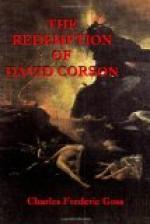“And so you really mean to die without bestowing your pardon upon those who have wronged you?”
“I swear it!”
“Have you ever heard the story of the crucifixion of Jesus Christ?” asked Mantel, trembling at the name and at his own temerity in pronouncing it.
It was a strange situation into which this young skeptic had been forced by the logic of circumstances. As the old beggar felt the ethical necessity of another life, the young gambler felt the ethical necessity of the crucifixion. It seemed to him that if the redemption of this hate-smitten man hung on the capacity of his own heart to empty itself of its bitterness, there was about as much hope as of a serpent expelling the poison from its fangs! He had never before seen a man under the absolute and unresisted power of one of the basal passions, and neither he nor any one else has ever understood life until he has witnessed that fearful spectacle. A summer breeze conveys no more idea of a tornado, nor a burning chimney of a volcano, than ordinary vices convey of that fearful ruin which any elemental passion works when permitted to devastate a soul, unrestrained. The sight filled Mantel with terror, and he felt himself compelled by some invincible necessity to plead with the man in the name of the Saviour of the world. Long and earnestly he besought him to forgive as Christ forgave; but all in vain! So long had he brooded over his wrongs that his mind had either become hopelessly impotent or else irretrievably hardened. The conversation had so angered and exhausted the invalid that he presently crawled over to his bed, threw himself upon it and sank almost instantly into a deep sleep.
With a heavy heart, Mantel left him and hurried home to report the interview to David. He found him just returning from his work, and conveyed his message by the gloom of his countenance.
“Has anything, gone wrong?” David inquired, anxiously, as they entered their room.
Casting himself heavily into a seat and answering abstractedly, Mantel replied, “Each new day of life renders it more inexplicable. A man no sooner forms a theory than he is compelled to abandon it. I fear it is a labyrinth from which we shall none of us escape.”
“Do not speak in parables,” David exclaimed, impatiently, “If anything is the matter, tell me at once. Do not leave me in suspense. I cannot endure it. Is he worse? Is he dying?”
“He is both, and more,” Mantel answered, still unable to escape from the gloom which enveloped him.
“More? What more? Speak out. I cannot bear these indirections.”
“I have at last drawn from him a brief but terrible allusion to the tragedy of your lives.”
“What did he say? Quick, tell me!”
“He said that he had been wronged by those whom he had benefited.”
“It is too true, God knows; but what else did he say?”
“That he would spend eternity in revenging his wrongs.”




